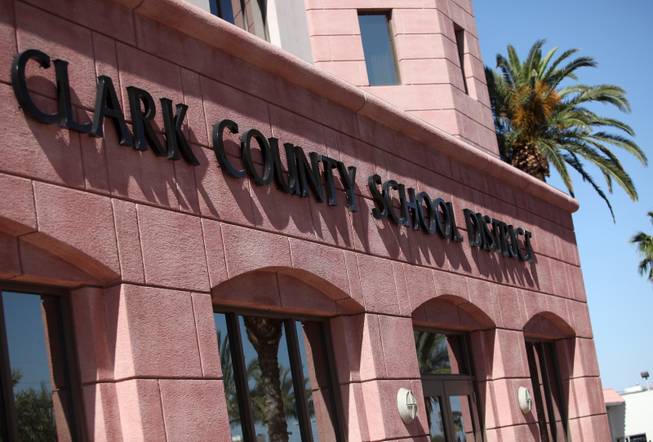
The Clark County School District offices are shown in Las Vegas in May 2009.
Thursday, Dec. 21, 2023 | 4:23 p.m.
The Clark County teachers union has tweaked its legal bid to overturn the state law banning strikes by public employees, a group that includes educators.
The Clark County Education Association abandoned the lawsuit against Clark County School District and the state of Nevada as a standalone action in Clark County District Court on Tuesday. The argument has instead been rolled into the case CCSD launched against the union in July to prevent a strike.
The arguments, now within a motion in that case, haven’t changed. They assert that the law barring strikes by local and state government employees runs afoul of the free speech and due process provisions guaranteed by the U.S. and state constitutions.
“Here, CCEA seeks to amend its pleadings so that it may have the Court entertain its constitutional arguments and, if necessary, to put itself in position to make those arguments to the Nevada Supreme Court, should that become necessary,” the motion said. “It is not picky about how that occurs.”
Both the school district and the state had sought dismissal of the anti-strike repeal case, which the union filed in October. The case had been set for its first hearing in January.
The union sued after a judge determined that CCEA was responsible for the first public-sector strike since they were outlawed more than 50 years ago.
That determination put CCEA under a court injunction barring teachers from work stoppages like the rolling strike that the judge declared was underway in September, when eight schools closed for a day each because of a large number of teachers calling out sick. The union denied involvement and appealed the case to the Nevada Supreme Court, where it is pending.
The school district said the case was flawed on procedural and merit grounds, characterizing it as a “horizontal appeal” to overturn the injunction barring by filing a new lawsuit within the same court, calling it “blatant judicial gamesmanship.”
The state said that conduct, as opposed to speech, is generally not protected by the First Amendment unless it is “inherently expressive.” If additional “explanatory speech” is necessary then it is not inherently expressive conduct, implying that the sickouts required explanatory speech.
In its motion to transfer its argument against the anti-strike law, CCEA said that CCSD said that any challenge to the ban must be attached to the injunction case, and while the union disagrees, it would do so “in the spirit of setting the table appropriately.”
On Wednesday, CCSD and CCEA announced a new teacher contract after months of acrimony that included the court-deemed strike and injunction. An arbitrator green-lit a contract that will, among other things, give teachers a 10% across-the-board raise this school year and 8% next year, and bring the entry-level salary to $53,000.
